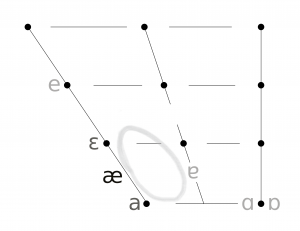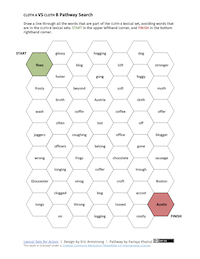3 The TRAP Lexical Set
 The trap lexical set is one of those sets that can only be found in Checked syllables. trap can be in either stressed or unstressed syllables. While many accents have near-close front articulation with [æ], there are also more close variants such as [ɛ], and more open ones, such as [a].
The trap lexical set is one of those sets that can only be found in Checked syllables. trap can be in either stressed or unstressed syllables. While many accents have near-close front articulation with [æ], there are also more close variants such as [ɛ], and more open ones, such as [a].
Known traditionally as the Short A, it is sometimes called the “Flat A” in North America, where a very spread pronunciation is not uncommon; however, Flat A is apparently used in the UK for a mid-open central version of trap, [ɐ]. trap evolved from the short /a/ vowel in Middle English.
For most of the US and Canada, trap is merged with bath, whereas in the south of England bath is merged with palm. (see the bath Lexical Set)
trap can be a diphthong, too, as heard in parts of the South of the US, where, similar to kit and dress, it can be a centring diphthong, [ɛə̯] on stressed syllables. In other parts of English speaking North America, many varieties of English have a split trap system, with a short trap monophthong [æ] in some contexts, and a long, centring diphthong [iə̯ ~ eə̯ ~ ɛə̯] in others, most commonly before /n/.
In the north-west Midlands of England and along the border with Wales, trap + /n/ can be rounded, making a word like band [bɒnd]. The Alternate keyword hand has been coined for this allophonic change.
- ☑️ Checked: requires a following consonant, and cannot exist on its own
- in both stressed and unstressed syllables
Spellings
aC, aiC
trap is easy to identify, as its spelling is very regular: it’s ‹aC›. There are a very small number of trap words spelled ‹aiC›: plaid, Laing, plait*, Naish*, craic; apart from those, which one can memorize, trap is totally straightforward. Note that there are words that are classified as part of bath that can merge with trap which, unfortunately, are much more challenging to identify.
Pronunciations
The trap lexical set is pronounced in many accents of English with [æ]. In some cases, trap is more open, [a], as we often get in the North of England, Ireland, parts of Wales, India, and the Caribbean. In other cases, trap can be more close, [ɛ], as we get in clipped, traditional RP, New Zealand, South Africa, and Cockney. In Northern Ireland and Scotland, trap can be merged with palm, leading to central and even back variants, [a̠ ~ ɐ̞ ~ ɑ̟].
As mentioned above, in many parts of North America trap can be a centring diphthong [eə̯] in many environments, most notably before /n/, but in some accents as many as 80% of the environments take the offglide, while only 20% are a pure monophthong. Perhaps this split trap feature was most famously parodied in the movie musical Singin’ in the Rain in the speech of Lina Lamont (Jean Hagen), with her line “and I can’t stand ‘im!⧉” The distribution of the environments where this happens is quite complex, and can be quite challenging to identify. (See Splits below for more.)
In many parts of the U.S. South, trap can also be a centring diphthong, going as far as [ɛə̯] in stressed syllables. In these accents, the nucleus of the dress lexical set is always higher in the vowel space, [eə̯], than the nucleus of the trap diphthong.
Personal Pronunciation
Let’s explore your trap pronunciation, shall we? Take some time to explore the words from the list below with a classmate, friend, coach or teacher, or on your own, to identify how your trap vowel compares with the way(s) others say it. Try lengthening the sound of your trap vowel in order to hear its quality a bit better, and then attempt to shift where it’s articulated in your mouth around within the vowel space—up, forwards, down, and back—by tiny, almost imperceptible shifts. [If you have a diphthong pronunciation, where you have an offglide moving toward the centre of your mouth, focus on the nucleus of your trap vowel as you do this.] You should feel the top surface of the back your tongue moving towards/away from the roof of your mouth, in the direction of the space just behind the alveolar ridge. What’s the smallest noticeable change that you can make?
If your trap vowel is (use the symbol that is most appropriate for your speech)
- high, use the raised diacritic [ æ̝ ], a small T pointing up
- open, use the lowered diacritic [ æ̞ ], a small T pointing down
- pushed forward, use the advanced diacritic [ æ̟ ], a tiny plus sign +
- pulled back, use the retracted diacritic [ æ̠ ], a tiny minus sign –
- moved toward the middle of the mouth, towards schwa [ə], use the mid-centralized diacritic [ æ̽ ], a tiny x-marks-the-spot above the symbol,
Alternate Pronunciations
Experiment with the Word Lists, Phrases and Sentences with the following vowels:
As you move the vowels in the directions offered here, explore whether that modified oral posture might inspire you to move the articulation of consonants and other vowels in the word in similar ways. Does it remind you of an accent other than your own?
Word Lists for trap, sorted by the consonant that follows
KEY: ◾︎trap in stressed syllable ◽︎trap in unstressed syllable
PLOSIVES
-p
-b
-t
-d
-k
-ɡ
AFFRICATES
-tʃ
-dʒ
NASALS
-m
-n
-ŋ
FRICATIVES
-θ
-ð
-f
-v
-s
-z
-ʃ
-ʒ
Vowels followed by /r/ and /l/ often are affected by the following consonant.
⚠︎ In parts of Ireland, trap+/r, l/ raises to [ɛ], while in most other environments it is [a].

In order to practice these vowels without the following consonant affecting them, experiment with the “Consonant Chop” technique. Speak the word without the following consonant and all that comes after it, chopping the word off right after the trap vowel. For example, for carry, you would start by saying “ca-“ then, as two units, say “ca- -rry”. If you’re working on using the [æ] vowel, that would be something like [kæ — ɹi̽]. Then try putting the two syllables closer and closer together, [kæ – ɹi̽, kæ -ɹi̽, ˈkæ.ɹi̽, ˈkæɹi̽]. You can also try a different vowel, say [a], and change the /r/ to a tap [ɾ] [ka – ɾɪ, ka-ɾɪ, ˈka.ɾɪ, ˈkaɾɪ]. If you have success with that more extreme oral gesture, then you can attempt the [æ.ɹ] version afterwards. Similarly you can do this with /l/, such as with the word “fallow.” Chop the word in two before the /l/, e.g. “fa- -llow,” [ˈfæ — ləʊ̯, ˈfæ – ləʊ̯, ˈfæ – ləʊ̯, ˈfæ.ləʊ̯, ˈfæləʊ̯].
Though in some accents trap when followed by ‹r› can become the centring diphthong square,e.g. [ɛː], [ɛə̯] or [ɛɚ̯], it doesn’t in all accents: it can simply be trap plus a consonant /r/. Recently the most famous exemplar of this is “Harry Potter.” This contrast relates to the Merry-Marry Merger (see more below, under Mergers); if the two sets are different from one another, then you don’t have the merger.
Try the words below with a clean trap vowel, with no offglide to schwa (or r-coloured schwa) before the consonant /r/.
-ɹ* (for those with the Merry-Mary Merger, see square: Approximants and dress: Approximants)
When followed by ‹l›, the vowel is sometimes pulled back, especially if /l/ is articulated with the dark-l [ɫ], which may move the vowel more towards schwa [ə] (particularly in unstressed syllables), or to the back vowels [ ɑ, ɒ ]. In some accents, a very dark-l can lead to the vowel being “swallowed” by the /ɫ/, making it syllabic [ ɫ̩ ].
-l/ɫ
Short Phrases
- That man is a fat cat.
- Keep track of your Slack account.
- A TicTac snack attack.
- An Italian cabbage salad.
- Kampala* and Casablanca* are in Africa.
- Shall we have macaroni Alfredo*, Jack?
- Carol* and Sharon* met Barry* and Harris*.
- The Flash-based app crashed my Mac.
- Alexander planned his capitol to be in Babylon.
- Fans in Paris loved his mastery of the jazz saxophone.
- It was magic when Harry* held Barry’s* hand.
- The psychopath had a passion for fashion.
- Cameron began to slather the lather on his face.
- The pavlova that Frank Laing baked was rank.
- Zeynab began boot-camp while fasting* for Ramadan*.

Sentences
Level 1
Short with 2-3 words, underlined
- Paul Frommer invented Avatar’s conlang, Na’vi.
- The potlatch was for family and clan members only.
- Nash and Alix clashed.
- Rashid gave blood plasma to Baz.
- The cat gave Cathy toxoplasmosis.
Level 2
Short with 4-5 words, underlined
- Hotel California is a fantastic album.
- Japan used strategy to defeat Canada at the Curling Championships.
- The trap with a Frappucino is the caffeine and the calories.
- To the casual observer, Jean Piaget’s* work didn’t have much impact.
- Cassandra got a Volkswagen Passat* for their family, rather* than* a minivan.
Level 3
Medium with 3-4 words, not underlined
- Scarlett Johanssen was cast* as Natasha Romanoff in Black Widow.
- Did Maria von Trapp like black satin sashes?
- Arabic has a voiced palato-alveolar affricate, /d͡ʒ/, ج, ǧīm.
- Calculate the salary of the Nashville trash collector.
- Sarcasm and passive aggression are Ashley’s Love Language.
Level 4
Hard with 4-6 words, not underlined
- The scantily clad man did have a great tan.
- Do they sell classic bathroom vanities and cabinets on Amazon?
- The Alaskan Malamute is an affectionate pack animal.
- The Germans’ rapid attack went north of France’s Maginot Line.
- The paramilitary’s arms cache was found in barrels in the back of the tavern.
Mergers
The trap-bath Merger is found in most of English speaking North America, and in much of the North of England; meanwhile in much of the rest of the English-speaking world, bath is merged with palm, and in non-rhotic Englishes, with start. In fact, this whole chapter has essentially been about learning to distinguish between trap, bath (and palm). There are very few minimal pairs/homophones with trap and bath, though a few examples include: ante/auntie, cant=Kant/can’t, plantar/planter; there are near-minimal pairs with gather~blather~slather/lather~rather, lass~mass/class~brass, sociopath~math/ path~bath.
- If you have the trap–bath merger, differentiate them in the following sentences: [æ/ɑ̟, a/ɑ̠, ɐ̞/ɒ, ɛ/ɑ, ɛ̠ə̯/a, eə̯/ɑ̟].
- If you don’t have the merger, try to make them match using either your person trap vowel, or one that is new to you: [æ, a, ɐ̞, ɛ, ɛ̠ə̯, eə̯].
- The cat’s fatherp can’t catch half the mice it will have to.
- Patrick sat in the enchanting bathroom in the aftermath of dancing with the daft actor.
- The montagep of the masked man in the last scene was masterfully performed by the acting class.
- Actually, Dad’s Newcastle Brown Ale, served in dirty glasses, tasted rather ghastly.
- It was laughably bad casting to choose Wolfgang to play the Nazip commander.
- The ample free samples of veggie lasagnap were an example of the chancellor’s substantial bravadop.
The trap-bath-palm Merger, found in Scotland and parts of Northern Ireland, merges all three ‹a› vowels into a single group, in or around [a ~ ɐ]. There are no minimal triplets for these merged sounds, though the rhyming gather/rather/father is as close as you’re going to get! If you have this merger, you can use the sentences to practice avoiding the merger; if you don’t have the merger, try making all the trap–bath–palm words in the sentences match using any of these options: [a, a̠, ɐ̞, ɐ, ɑ̟].
- My father made a travel plans to Yokohama to visit my aunt in the last week July.
- This afternoon, Nadia built a panda sanctuary on Minecraft Java Edition.
- The soprano jazz singer demanded half of the solos as she claimed to have the best vibrato.
The dress+/r/-trap+/r/ Merger is commonplace in much of North American English, and commonly referred to as part of the Merry-Marry-Mary Merger, though some regions have neither, or only one merger.
Minimal Pairs for dress+/r/ vs. trap+/r/ include: Perry/parry, berry=bury*/Barry=Barrie, terry/tarry, merry/marry, herald/Harold, perish/parish. The sentences below include the square merger as well.
- The merry fairy named Mary took the ferry to marry hairy Harry in Paris.
- Terry and Barry Berry tarried before buying two very varied dairy farms in Derry.
- I was scared to be on the terrace as the floor was transparent and it was very narrow and precarious
- Gerald told Barry it was necessary that they prepare the ring bearer before the marriage ceremony.
- Apparently, Sharon, the librarian, made repairs for the book that was very terribly damaged.
Splits
Long trap Split, aka “Ash Tensing” (as ash is the name of the symbol [æ] typically used for trap), the vowel is “tensed,” with a closer articulation in the range of [ɛə̯, eə̯, ɪə̯]. It can occur in varieties of North American English before /n/ in words like man, voiceless fricatives like path, and nasals+obstruents, like dance, damp. In New Orleans’ “Yat” accent, and in the accents of New York City, Baltimore, Philadelphia and Boston, environments can also include syllable final /-b, -d, -dʒ, -n, -m, -f, -v, -s, -z, -θ, -ð, -ʃ, -ʒ, -ɡ, -ɹ, -l/. Note that each community has its own list of which environments are allowed, and even then many speakers within a given community will have their own idiosyncratic version of how the sounds should be distributed.
There are so many environments, that I find it easier to remember the environments where tensing doesn’t occur; for example, in New York City, you get monophthongal trap before / -p, -t, -k, -ŋ/ and sometimes /-d/. Also, it’s worth noting that New York City has a fairly low (open) trap vowel for that monophthong [æ̞], in words like clap, hat, back, sang. Some speakers differentiate function words, which don’t take Ash-tensing, from content words, which do, so that the verb to halve (which does take Ash Tensing, e.g. [hɪə̯v]), is not homophonous with to have, (which does not [hæ̞v]).
Review
Pathway Puzzles
 Pathway Puzzles allow you to practice finding members of a lexical set. Choose the next cell with the FIRST lexical set word to make a pathway from the START of the puzzle down to the FINISH. Open the KEY document to see the solution, and check your work. Pathway Puzzles were created by Farisya Khairul, through support from a AMPD Minor Research Grant.
Pathway Puzzles allow you to practice finding members of a lexical set. Choose the next cell with the FIRST lexical set word to make a pathway from the START of the puzzle down to the FINISH. Open the KEY document to see the solution, and check your work. Pathway Puzzles were created by Farisya Khairul, through support from a AMPD Minor Research Grant.
A vowel that changes state, with a nucleus that begins on the periphery of the vowel space and moves toward a coda that is in the middle of the mouth, usually schwa /ə/. Here, we mean the sets NEAR, SQUARE, START, NORTH, FORCE, and CURE, whether they are rhotic or not. (US spelling: centering diphthong. )
A historical process whereby one phoneme (or lexical set) subdivides into two or more phonemes/ lexical sets.
A phonetically distinct variant of a phoneme, used in different circumstances. For example, in the speech of many Canadians, the vowel of "lout" is a distinct allophone [əʊ] when compared to the vowel [aʊ] in "loud," both of which are from the MOUTH lexical set, with the phoneme /aʊ/. "Allophonic" (adj.) refers to this kind of variation.

